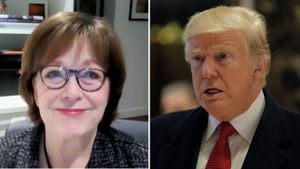Reactions have stirred dramatically since Robert F. Kennedy Jr. was nominated by former President Donald Trump as the next Secretary of Health and Human Services (HHS). Kennedy, known for his controversial views on vaccines and health policy, has ignited discussions across the political spectrum, sparking both support and condemnation from influential figures.
Most recently, Colorado Governor Jared Polis found himself entangled in waves of confusion after expressing excitement over the nomination, only to later clarify his position. Initially, Polis noted on X, formerly Twitter, his enthusiasm for the news. "I'm excited by the news" surrounding Trump’s choice of Kennedy, which led to significant backlash from constituents who remembered Polis describing Kennedy's campaigning efforts as troubling.
A spokesperson for Polis clarified his comments, stating, "Governor Polis has not changed his view as a whole on RFK Jr. or on the Governor’s previously stated concerns about some of RFK Jr’s positions." This double-take left many constituents puzzled, especially after Polis previously criticized Kennedy's anti-vaccine beliefs. Back in August, he had tweeted, "Not sure how bringing back Measles and bringing back Polio makes anyone more healthy." His remarks reference Kennedy's long-standing skepticism toward vaccines, which has led to fierce debate among health officials.
Kennedy’s history of promoting conspiracy theories extends well beyond vaccines. He has made claims linking environmental factors to childhood gender identity, spreading discredited theories about autism, and even questioning the relationship between HIV and AIDS. A report from The New York Times highlighted Kennedy's recent health struggles, including battles with a brain parasite, raising eyebrows about his ability to handle such significant public duties.
While Polis reluctantly acknowledged Kennedy's nomination, he expressed hopes for Kennedy to focus on broader health issues. The spokesperson indicated, "While opposed to RFK’s positions on various issues including vaccines and banning fluoridation, he would appreciate seeing action on pesticides and efforts to lower prescription drug costs." Such positions reflect Polis' cautious approach to engaging with Kennedy's controversial past.
Health professionals have not shied away from expressing concern either. Dr. Kavita Patel, a physician with extensive expertise in health policy, articulated why Kennedy’s possible appointment could be dangerous for public health. "This isn’t just about political disagreement," Patel warned, emphasizing the potential consequences of having someone with Kennedy’s track record influencing health decisions. Patel expressed alarm at the notion of HHS being led by someone who has publicly undermined established scientific consensus. She painted a grim picture of what could happen if unscientific beliefs took precedence over evidence-based practices at the federal health department.
There is mounting worry, particularly about Kennedy's behavior potentially leading to reduced vaccination rates and the resurgence of preventable diseases. Patel elaborated, saying, "If he were to implement policies based on these unfounded beliefs, it could lead to decreased vaccination rates. This places vulnerable populations at significant risk, potentially resulting in outbreaks of diseases like measles and polio."
This sentiment is echoed by many public health advocates who argue the role of the HHS Secretary is to protect the health of Americans. With the agency overseeing institutions such as the Centers for Disease Control and Prevention (CDC) and the Food and Drug Administration (FDA), concern intensifies over Kennedy's proposed approach, which includes plans to overhaul the FDA and its regulatory processes.
Kennedy's comments about raw milk consumption have raised eyebrows among health professionals, sparking fears it may lead to more foodborne illnesses. While some advocate for reforming food safety regulations, they warn against policies resulting from flawed underpinning. Patel acknowledged the virtues of maintaining healthy skepticism but cautioned against allowing baseless theories to guide health decisions.
Another significant issue is the possibility of Kennedy's skepticism toward water fluoridation, which is widely regarded by health professionals as beneficial for dental health. Patel warns, "His stance on issues like water fluoridation could lead to policy changes harming millions, disrupting long-standing public health measures."
Despite Kennedy asserting to NPR, "we’re not going to take vaccines away from anybody," skepticism remains about his intentions and how his potential policies could reshuffle the public health paradigm. Kennedy's strategic focus is perceived by many as veering too close to anti-scientific territory, which could have real impacts on health funding and public trust.
The Health and Human Services Secretary has immense influence over public health policy, determining the availability of health care services, the safety of food, and the information disseminated to the public about health risks. With Kennedy at the helm, there are fears of decreased trust and access to reliable health information.
The growing backlash against Kennedy's nomination taps deep within the fabric of health policy and public trust. Many people are beginning to advocate for leadership grounded firmly within scientific evidence, urging the nomination committee to reconsider Kennedy’s credentials for this pivotal role. Historical precedence shows it’s imperative for the head of HHS to support not only the integrity of scientific data but also the importance of public health standards.
Patel's call to action resonates with her colleagues: "The health and well-being of our nation depend on leadership at HHS respecting and upholding scientific integrity and practices based on solid evidence." Potential policies under Kennedy could unravel decades of advancements made public health, especially during times where scientific guidance is pivotal for lawmakers facing complex health issues.
Consequently, the conversation around Robert F. Kennedy Jr.'s nomination is not just confined to political realms; it delves deeply—potentially putting at risk the health of Americans. The stakes have never been higher as the nation awaits to see whether Kennedy's views will gain traction or if the concerns from the health community will steer the discussion otherwise.



